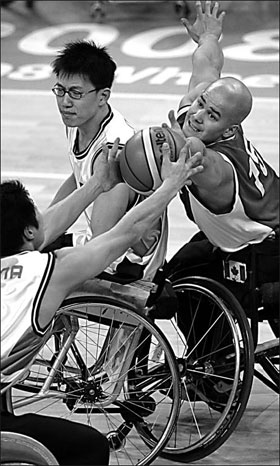Big time wheelchair hoops roll into China
Two-time gold medalist David Durepos dribbled down the sideline, turned on a dime but was boxed in by traffic, then wheeled around again before hitting a teammate with a no-look pass for an easy score.
Durepos and his Paralympic champion Canadian team put on a wheelchair basketball clinic against the Chinese national team, winning 69-47 and showing off some world-class flair to the host of September's 2008 Paralympics.
"I want to thank Canada for giving us this opportunity, especially the Canadian coach who helped us a lot by not playing his best players," China's coach Xu Yuansheng joked after the game, one of a series of Olympic and Paralympic tune-up events.
|
David Durepos of Canada (right) fights for the ball with Chinese players during a group match at the "Good Luck Beijing" 2008 Wheelchair Basketball International Invitational Tournament last month. Zhong Ti |
"Canada is the world champion, so our team lags quite far behind. We are not only behind in technical ability, but also experience."
Although the sport has been played in China since 1984, the world's most populous nation has only a couple hundred players competing on two dozen men's and women's teams.
By contrast, over 100,000 people worldwide play in a wide range of amateur and professional leagues.
Yet the building blocks for huge growth are there. China has 60 million disabled people and basketball is hugely popular in a country where homegrown NBA stars like Yao Ming are idolized.
China already has become a Paralympic sports power, climbing from ninth on the medals table in the 1996 Atlanta Games to No 1 at Athens in 2004. Yet wheelchair basketball has lagged.
"Chinese athletes are still concerned about the stigma of being disabled so a lot of players who qualify to play (in disabled sports), don't dare join in," Xu said.
"We think the Paralympic Games are going to advance wheelchair basketball in China and we think more and more disabled people will come to love this game."
The tune-up event in Beijing brought top world men's and women's teams from Canada, Australia, the Netherlands, Germany and Japan.
Though they struggled to compete, the Chinese teams impressed with their enthusiasm.
"I have every confidence that the Chinese will be in the top six in the world in three to four years' time," said Jerry Tonello, Canada's men's coach.
"I think their skill level is already quite high and it is always great to see athletes playing with enthusiasm and speed."
Li Pengcheng, 27, China's sharp-shooting guard, began playing wheelchair basketball at an outdoor court at a convalescence home while recuperating from an accident that left him paralyzed.
After toiling on the court 45 minutes a day for three years, he ended up getting an invitation to the national team in 2004.
"After I got injured, I thought that I would never be able to play basketball again," said Li, who led his team with 16 points in the loss against Canada.
"But then I found out about wheelchair basketball and I've been playing ever since. This has made me very happy."
The matches drew considerable interest, with many broadcast on local television, spurring talk of China's great potential if the pool of players was enlarged.
"We don't get a lot of opportunities to play against such high-quality teams, after playing them we are seeing a lot of our shortcomings, so I want to get back to practice and work on this," Li said.
Canada's star guard Durepos, one of the world's top players, said China had already improved since he last played them in 2006.
"This tournament is going to help them get stronger because once people see what they can do out there on the floor, then they stop dwelling on the things that they can't do," Durepos said.
AFP
(China Daily 02/19/2008 page23)















